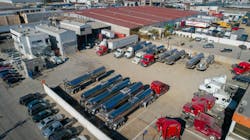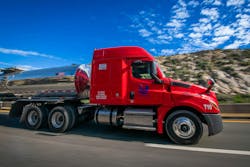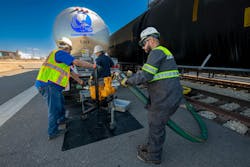Spirit of Mexico: Familial bonds buoy tequila hauler’s business
In Mexico, “la familia es todo.”
For non-Spanish speakers, that translates to family is everything, and this idea is exemplified in Transnational Lines’ relationship-oriented approach to growing the Angels’ tank truck business on both sides of the border, from partnering with Mexican trailer manufacturer Retesa to develop the first bulk tequila tankers for cross-border transport, to expanding its U.S. chemical-hauling division with transload partner Ventura Transfer Company—both family-owned operations.
“Our customers are the world’s largest petrochemical companies, and they’re very particular, especially the German ones,” said Randy Clifford, Ventura chairman and CEO, and recent past National Tank Truck Carriers chair. “They’re very detail oriented. They want things done in a specific way, on a very precise schedule. Mexican carriers, in general, don’t function quite like that. For them, it’s more of a relationship than a strict business arrangement.
“[Transnational CEO] Santiago [Angel Gutierrez] wants to work with the Cliffords—as opposed to Ventura Transfer.”
By putting people “primero,” Transnational—founded in 1979 by Santiago’s father, Jorge Angel Rosales, in Guadalajara, Jalisco—today is the largest exporter of bulk tequila into the U.S. and Canada, and a growing hauler of liquid sweeteners and chemicals in the States. And by leveraging its unique supply chain expertise, including specialized food-grade equipment and Kosher-certified tank cleaning facilities in Mexico, Transnational is fending off market challenges, including tariff uncertainty and new English language-proficiency requirements for drivers.
The international bulk hauler currently is testing Scania trucks in Mexico and a new terminal location in Laredo, Texas.
“We feel good about our position,” Santiago said. “We have another business, Agave Azul, that has been growing agave plants since my great grandfather’s time, so we know the tequila business, and food-grade transportation, very well. We’ve always been tightly connected to the key players, and we understand what’s going on in the industry and how it’s evolving.”
Family-owned, tequila-driven
Santiago’s father started out transporting “tequila a granel,” or bulk tequila, for the Beckmann family, majority owners of Jose Cuervo tequila, from their factory to Tijuana as Transportadora de Liquidos JAR. Then he branched out, hauling wine for L.A. Cetto and tequila for other major producers, like Sauza and Orendain. Santiago and his brother, Jorge Angel Gutierrez, Transnational chief operating officer, joined the business in the mid-1990s, around the same time the company first ventured into the U.S. through a partnership with Oakley Transport.
“My father was focused on Mexico, but my brother and I wanted to do more in the U.S. because we saw it was a bigger market,” Santiago shared. “So we bought the U.S. business from him and started Transnational Line [in 2001].”
Cargill was the brothers’ first big U.S. customer. Today, Transnational also hauls sweeteners, concentrated juices, and avocado oil for leading manufacturers like Coca-Cola, ADM, Bimbo, and Zucarmex; and tequila and alcohol for AB InBev, Cutwater Spirits, and Maestro Dobel, with a fleet of 300 trucks and 400 tankers. “We’re exporting 80% of the over-the-road bulk tequila that goes into bottles in the U.S.,” said Luis Huerta, Transnational director of operations. Santiago estimates that equates to about 500,000 liters per week—or 6.9 million gallons annually.
The Angel family still operates their original transport company in Mexico, along with several other businesses, including their 800-hectare agave farm; Anguz Transportation, which runs 50 trucks, 50 dry vans, and 30 refrigerated trailers in Mexico; and Premium Tank Wash (PTW). Transnational is headquartered in San Diego and maintains U.S. sites in Los Angeles, and El Centro, California (with Ventura); and Mexican terminals in Guadalajara and Tijuana—where the PTW wash racks are located—Mexico City, Mexicali, and Hermosillo.
“There aren’t many carriers who do what we do, and no one who does it like us,” Huerta asserted.
Inspiration for bulk innovation
Transnational’s fleet now includes tank trailers from Polar Tank and West-Mark, and Mexican manufacturers Elk Tanks and Retesa—which built the first tequila trailer for cross-border transportation in 1995. “Before that time, you could transfer bulk tequila at the border to a U.S. trailer, which would take it to its final destination,” Santago explained. “But then the CRT [Consejo Regulador del Tequila], which regulates the industry in Mexico, prohibited transloading tequila, so you had to load one tank that also made the final delivery.”
The Prietos, who own Retesa, and Angels worked with CRT to design the first 407s that comply with U.S. Department of Transportation and Mexico’s Secretariat of Infrastructure, Communications, and Transportation (SICT) regulations. Retesa delivered the first 10 units within six weeks, and Transnational made the first door-to-door delivery of bulk tequila—which, at 50-55% alcohol is both food-grade and flammable—from Mexico to a San Jose-area bottling facility operated by Diageo, owner of Don Julio tequila, soon thereafter. Retesa’s modern tequila tanks are 40-ft., 25,000-liter (6,604-gallon) stainless-steel units Transnational pairs as doubles in Mexico, where vehicle weight limits are higher, and splits into two truckloads at the border. “We like developing tanks with our customers,” said Rene Prieto Jr., Retesa general manager, and son of founder Rene Prieto Sr., the company’s chairman.
“Our engineering department is very specialized, we’re highly involved in every aspect of the design process, and my father still helps a lot.”
Retesa has sold 50 tankers to Transnational since 2010, Rene Jr. estimated, and sanitary trailers now are a key offering in the OEM’s diversified product line, which includes chemical, fuel, and dry bulk tanks increasingly available in the States. Retesa added Littlejohn Tank and Equipment as a U.S. dealer earlier this year. “Our top goal is to continue selling trailers to long-term partners. We don’t want to sell to them once. We want customers for life.”
Mexico’s spirit, distilled
Life-long business relationships are equally important to Transnational, and Ventura Transfer—a 156-year-old carrier the Cliffords acquired in 1957. They chose to partner with the Angels in 2017 after Greg Clifford, Ventura chief operating officer, and Randy’s brother, visited Transnational’s Guadalajara location. “He came away very impressed,” Randy relayed. “He said he hadn’t seen a terminal facility in the United States that was better than the one he saw there.”
See also: Ventura CEO reflects on NTTC chairmanship
In El Centro, Ventura receives products in tank cars and transfers them into trailers Transnational delivers to “maquiladoras” like Rheem and Ureblock in Mexico. The carrier now hauls 20-25 loads of poly oils and other chemicals out of the facility every week, Huerta said. “Sometimes they preload their tankers, and we pick up and deliver them, and sometimes we bring our tankers in to get loaded, depending on the customer and the process required,” he said.
Transnational currently dedicates 15 trailers to the partnership. And, in the Long Beach area, Ventura also is providing its specially designed drop-center chassis to Transnational, which uses them to haul ISO tanks in and out of ports. “They opened a new channel of business for Transnational Line, because we never had any thoughts of working with chemicals,” Huerta said.
“It’s been quite a lovely journey.”
The connection is a two-way street. Ventura can offer dependable service to Mexico, thanks to Transnational’s contacts and ability to expedite border crossings; and while most of Ventura’s existing consignees are just across the border, it now has a trusted partner who’s willing and able to take the family’s business much farther south. “We have a better relationship with them than any Mexican carrier we've worked with previously,” Randy said. “They’re great people.”
Bonds without borders
Transnational’s bonds with long-standing customers, transportation partners, and equipment suppliers are enabling growth amid ongoing complications, including tariffs and English-language requirements.
Tariff uncertainty, which only increased in August, decimated Transnational’s export business for about a month earlier this year before the Trump administration issued various delays and exceptions. “It was difficult,” Santiago said. “Many of our clients couldn’t plan ahead because they didn’t understand the impact, but it’s gotten much better.” He still worries about future impacts, but for now, bulk tequila—unlike Mexican beer—isn’t subject to additional taxes. “From what I hear, the products we handle aren’t the focus of Trump’s tariffs,” Santiago said. “He’s more focused on the automotive and steel sectors than commodities.”
The Federal Motor Carrier Safety Administration's push to enforce English-language proficiency (ELP) requirements is another concern Huerta fears will have “a huge impact” on binational drivers. But Transnational already implemented a training program and created a manual for drivers. “We’re trying to give them the tools they need to answer basic questions,” Huerta said.
Meanwhile, the company is moving forward, testing new tractors in Mexico and a new location in the U.S.
Transnational mostly runs Kenworth T680 mid-roof sleepers in Mexico, and Freightliner Cascadia and International LT trucks with dual license plates in the U.S., but it’s testing 10 Scania cabovers in Mexico. “They offer very good fuel economy,” Huerta said. “And comparing them to our conventional trucks is giving us good perspective on what’s next.” The carrier also recently sent its first load of increasingly popular agave nectar to Laredo, where it’s aiming to establish a presence in the busiest U.S. port of entry—starting with 20 trucks stationed at a family friend’s facility.
“We’ve had many offers over the years, but we didn’t go because we were so busy on the West Coast,” Santiago concluded.
“But now, I think, it’s time.”
About the Author
Jason McDaniel
Jason McDaniel, based in the Houston TX area, has more than 20 years of experience as an award-winning journalist. He spent 15 writing and editing for daily newspapers, including the Houston Chronicle, and began covering the commercial vehicle industry in 2018. He was named editor of Bulk Transporter and Refrigerated Transporter magazines in July 2020.




